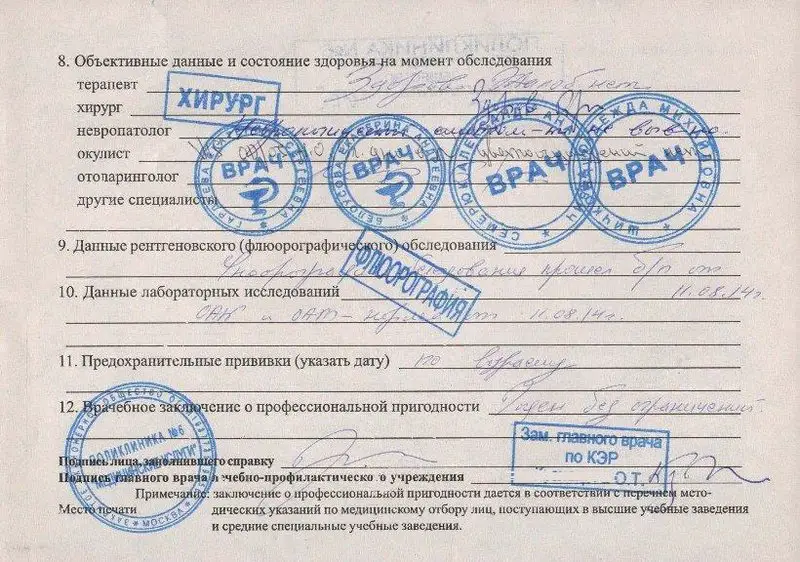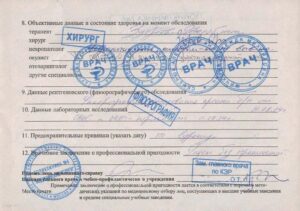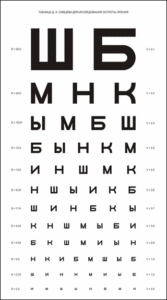Medical commissions and state medical examinations are fairly common in Russia. Students entering university programs have to undergo a battery of tests before entering university. Failing a test can mean that a student might need to undergo treatment before entering his or her university program.
Olga Dmitraschenko entered Moscow State University in 2006, after completing her high school experience via home schooling. She wrote of how completed the fairly arduous day of medical exams to enter her university program in Russia in the text that follows as part of a series of free Russian lessons sponsored by SRAS called Olga’s Blog. The blog documents – in simplified, modern Russian – Olga’s experience finishing high school, starting college, and living life in Moscow in 2006. The text, links, and format of this resource were last updated in 2023.
Briefly on State Medical Check-Ups in Russia
Although some efforts to establish a public health system were made under Tsarism, public health only really became widely available under the Soviets. The USSR established a ubiquitous and highly integrated state medical apparatus. Policies required citizens to visit the doctor regularly to combat widespread public health issues of the time and to make sure that citizens received timely preventative care.
Today, many of the health care systems of former Soviet countries still demand what can seem like invasive and excessive testing. Foreigners who desire work permits or residency status in Russia, for instance, must complete multiple tests to show that they are free of various diseases. Russians who want to drive a car, access swimming pools, play many organizational sports, or to be employed in professions working with food or transportation, all must undergo a battery of tests first.
Students are subject to this requirement as well. Arguments for this include that students arrive from a very wide geographic area, meaning that checking for contagious diseases is a smart precaution. Making sure that students see well and are generally healthy is also setting them up for success. However, any time that a very large population, such as MSU’s 35,000 students, all need to undergo the same procedure within a short time frame, this can create lines and inconvenience.
This experience is what Olga describes below.
Lines and State Medical Exams in Russia: Simplified Russian Text from Olga’s Blog
This is Lesson 7 of Olga’s Blog, a series of intermediate Russian lessons.
Note that:
- All of the bold words and phrases have annotation below.
- Red words and phrases indicate the subject of this blog entry’s grammar lesson.
- *Asterisks indicate slang.
Привет всем!
В прошлый раз я обещала написать про медкомиссию. Как только закончились летние экзамены, поступившим сказали – “Пусть все идут на медкомиссию до пятнадцатого сентября!” Счастливым ребятам, выжившим после вступительных, уже все было нипочем. Казалось бы, что тут сложного – проходишь осмотр у восьми врачей и получаешь справку. Получилось не все так просто. Врачи – окулист, невропатолог, стоматолог, отоларинголог, терапевт, хирург, дерматолог, физиотерапевт. Уж так много!*
Каждый день, подходя с друзьями к поликлинике МГУ и обнаруживая у входа очередь в сто, а то и больше студентов, мы со спокойной улыбкой говорили друг другу – “Ну, чё?* Зайдем завтра!” В результате медкомиссию мы проходили больше двух недель, каждый день проводя в поликлинике по три, а то и* по четыре часа. И в конце, геройски выходя от последнего врача – терапевта со справкой, мы чувствовали, что долг студента выполнен.
Очереди – серьезная проблема не только в поликлинике, где несколько часов подряд приходится выслушиваешь бесконечные рассказы бабушек про их болезни. Это еще и ожидание в библиотеках, гардеробах… А о том, что происходит между парами в столовой, лучше не рассказывать никому – за 10 минут перерыва студенты пытаются купить столько еды, чтобы хватило не только на следующую лекцию, но на весь учебный день.
Как видите, студенческая жизнь в МГУ кипит, и каждый день приносит какие-то дела и интересные сюрпризы.
Вроде о многом уже рассказала, а столько еще потрясающих новостей: наши преподаватели, вручение студенческих билетов, пансионат и многое другое. А теперь, мне надо готовиться к тестам. До фига еще работы!*
Пока! Удачи всем!
Vocabulary and Cultural Annotations
Медкомиссия: Medical Commission. As mentioned in the previous editions of Olga’s Blog, physical education is a required part of state university education programs. Students must pass a battery of tests before being allowed to continue with this part of their education. Also, going to a full team of doctors is not unusual in Russia. Certificates from medical commissions (in various forms) are also necessary to obtain a driver’s license, receive a work permit (for foreigners), use public pools, and more.
Вступительных: term which refers to entrance exams (see issue 4 and issue 5 of this blog). Note that here Olga is using a shortened term to refer to something that every student is very familiar with. Use of this term is not entirely correct, but fairly widely used.
Нипочем: Standard phrase in Russian meaning “not very serious,” or “cheap.” Note it is composed of three words (Ни-по-чем), but is written as one. Note as well that the subject of this sentence is actually “все.” The first words (cчастливым ребятам) are in the dative – meaning the full sentence could be translated as “For these happy folks, having survived their entrance exams, life was already a bowl of cherries.”
Окулист: Ophthalmologist (specialist in diseases and disorders of the eye)
Невропатолог: Neuropathologist (specialist in diseases and disorders of the brain)
Стоматолог: Stomatologist (specialist in diseases and disorders of the mouth, including cavities, but also all other conditions)
Отоларинголог: Otolaryngologist (better known in English as a “ear, nose, and throat doctor.”)
Терапевт: General Practitioner
Хирург: Surgeon (in Russia this position also diagnoses many internal disorders and diseases)
Дерматолог: Dermatologist (specialist in diseases and disorders of the skin)
Физиотерапевт: Physical Therapist (also diagnoses disorders that can affect range of motion and athletic ability)
Уж так много: So many (doctors). Note that “уж” is a corruption of “уже.” Again, this is not entirely eloquent to say, but is widely used. In its shortened form, the word adds emotion to the expression in which it is used.
Проходишь осмотр у восьми врачей и получаешь справку: Go for an exam with eight doctors and receive a certificate. The word “справка” is one with which anyone living in Russia will become well acquainted. They are essentially the way that levels of bureaucracy communicate with each other and anyone applying for anything must collect them and take them to the appropriate offices – usually to get the next “справка.”
Ну, чё: Slang phrase meaning “So (now) what?” When only the last part is used (“чё”), it can be translated roughly as “huh?” Note that the word is a corruption “что” and is considered fairly base (неграмотный). However, it is widely used, even among educated Russians. It is pronounced “ch-YO.”
А то и: Colloquial expression that translates as “if not.” This sentence translates as: “As a result, we spent more than two weeks at the medical commission, every day spending three if not four hours there.” The most standard and correct variants are “или даже” and “если не.” Other variants that can be used with the same meaning include: а уж…; что-что; не то…; and хотя и не.
Жизнь кипит: Slang phrase meaning “life is very busy” or “life is hectic.” It literally translates to “life is boiling.” In context, it could also translate to “things are (really) humming” or possibly “life is rockin,'” or even “life’s a riot.”
До фига еще работы: Slang phrase meaning (loosely): “I’m up to my ears in work.” Note that “фиг” is actually Russian for “fig” (the fruit). It is used in this context because it sounds very similar to a highly offensive Russian word that the speaker would like to have the strength and effect of without offending the listener. The word itself could be effectively translated as “freggin” or “freckin,” depending on geographic location in the U.S. It should go without saying that many Russians consider this term highly uncouth – use the expression with extreme caution if at all!
Удачи всем: Good luck everybody. A very common good-bye in Russia, but note that it is addressed to a group of listeners. Addressing one person would take the form “удача тебе” (familiar) or “удача вам” (polite).
Grammar Focus: Less Common But Correct Imperative Forms
The imperative mood is used to demand or require that an action be preformed. Obviously, the imperative can be seen as being quite powerful and using it with people with whom one feels one should be polite or with whom one does not have an established social relationship provides an excellent example of where grammar becomes mixed with cultural expectations.
Russian also has several non-standard formations of the imperative. Today’s “Olga’s Blog” gives one such example: “Пусть все идут медкомиссию до пятнадцатого сентября!” (Let everyone go to the medical commission before the fifteenth of September).
Constructions using “Пусть,” “Пускай,” or “Пускаете” followed by the third person present or simple future may also be used as the imperative mood in Russian.
Examples From Literature and the Press
Пусть все соберутся здесь. Возьмешь троих, наиболее крепких, и пойдете к убежищу. Сейчас нужно экономить силы. Э. Скобелев
Пусть будет так, как года два назад, Пусть встретимся надолго или вечно, Пусть наши встречи только наугад, – Хотя ведь ты работаешь, конечно. В. Высоцкий
Лучше пускай он будет всегда такой, чем как мадам Шталь или какою я хотела быть тогда за границей. Нет, он уже не станет притворяться”. Л.Н.Толстой
Grammar Focus: Conversational Forms of the Imperative
Russian has also developed slang forms of the imperative for certain verbs. For example, the grammatically correct versions of the imperative for the verbs ехать/ездить are поезжай(те).
There are, however, other forms which are not grammatically correct, but which are often used in conversation: съезди, едь, and поедь.
Examples from Literature and the Press
Съезди, съезди, – ухмылялся Калименков. – А мы подождем. Еще по чашечке выпьем. А. Якубовский
Едь как можно … Едь дальше на восток, пока машина не остановится или пока не закончится дорога. Д. Вэнс
More Free Russian Lessons From Olga’s Blog

The Language and History of Caviar: Olga’s Blog
Olga below describes the place of caviar in Russian food culture. In simplified Russian, she describes where the delicacy is harvested from, the major types of caviar, and how the types differ in cost and quality. We also provide an English primer below discussing more of the history of caviar, how it is eaten and […]

Mushrooms in Cultures and Cuisines: Olga’s Blog
Olga below continues her discussion of the deeply held place that mushrooms have in Russian culture. In part one of this discussion, she focused on how and where and find the mushrooms. In part two, below, she discusses how the mushrooms are preserved, prepared, and consumed. A staple of the regional diet for centuries, mushrooms […]

Mushroom Season Has Begun! Olga’s Blog
Olga below discusses the deeply held national tradition of mushroom gathering. An important part of Russian food tradition for many centuries, Russian children are taught in school from an early age to tell the difference between various types of native mushrooms. Many, like Olga, will go with relatives and friends to the woods to put […]

Study Abroad in America for Russians: Olga’s Blog
As part of her major program in international relations at Moscow State University, Olga applied to study abroad in the United States in 2007. As was not uncommon for students applying for study abroad in either direction, Olga hit several bureaucratic snags. What is perhaps most remarkable about the below text, however, is the description […]

What is the First Day of University Like in Russia? Olga’s Blog
Below, Olga discusses what a first year freshman experiences on day one of their college education. The day offers no classes. It is instead filled with speeches, handshakes, and status symbols. All of this is highly indicative of the role of formality and ceremony in Russian education and Russian society. This resource is part of […]








